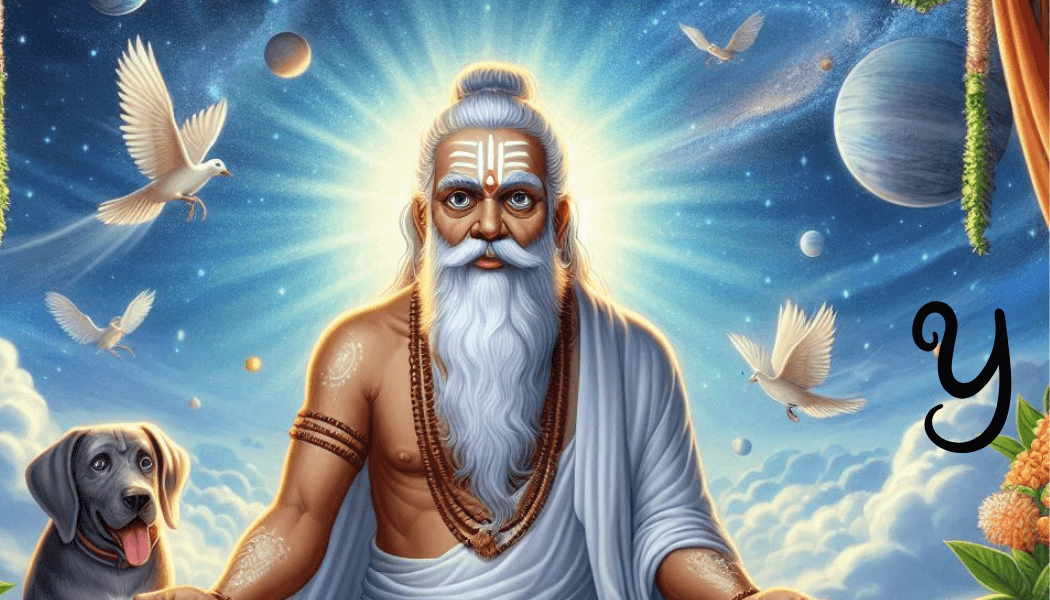Check the theme here: Pandava Mahaprasthana
***
“Nakula!” Draupadi called from the river. She was immersed up to her chest, her hair floating on the surface. “Help me wash my hair. The current feels stronger today.”
He bowed and replied. “As you wish, Rani.”
She gave him a mock glare as he grinned. Hitching his dhoti to wrap it around his thigh, he stepped into the river. The water was warming at the top and cooler at the bottom. They had spent over a year in Gaya, and Draupadi wanted to stay for another year, if not more.
Nakula supported her decision. He created a routine like his brothers and spent his time doing what he loved and with his family. The villagers often needed experienced men to handle the horses and treat them. With Sahadeva’s help, he trained the young men in caring for the majestic beasts. The lack of intergenerational sharing of traditional knowledge among the villagers surprised and worried him; he feared its permanent loss.
“Must be the approaching kali yuga.” He muttered.
Draupadi raised an eyebrow, curious about where the sudden thought sprang from.
Nakula explained, rubbing the soaked soap berries between his palms to create a lather. “People our age are no longer willing to teach the kids, Draupadi. They think sharing their knowledge and experience would reduce their importance. How will the young ones learn without our guidance?”
“That’s worrying! It’s our responsibility to guide them on the right path and equip them to deal with life without deviating from their dharma.” Draupadi said and sighed as he gently massaged her scalp with his fingers, working the lather all over her head.
Despite being eighty, her hair was lush and long, albeit grey. It suited her, Nakula thought. She looked regal no matter what and was so different from his mothers. He didn’t remember his birth mother much, except that she loved them. He could recollect a faint trace of her features if he tried hard. She was a rare beauty with a melodious voice that lulled him and his brothers to sleep every night.
***
Nakula and his twin were about seven, the youngest of Pandu’s sons, all born through niyoga with various devas. His mother chose the Ashwin twins and conceived twin sons. Nakula knew this didn’t please Maa Kunti much, but she couldn’t resist their cuteness. It wasn’t a secret. She said as much.
“O Madri, these little ones are so adorable! Wait and see, they will grow into the most handsome men ever.” Kunti gushed, squishing him and Sahadeva to her ample bosom. They were toddlers, crawling and climbing all over.
He saw his mother grin. “More than our Arjuna?”
Kunti laughed. “Of course! Take my word. Nakula will be the most handsome man in the entire Bharatavarsha. And my Sahadeva, he will steal hearts with his sensitivity. I know I was angry with you, but not anymore. How can I when you gifted us these precious babies?”
His mothers wiped their eyes and hugged the twins in between.
“Me too!” Bhima roared and rushed to throw his arms around them. Arjuna jumped on them next and Yudhistira came last, his excitement a little subdued but clear in his firm grip.
Such moments weren’t rare in his childhood. Though they lived in huts surrounded by nature rather than material wealth, the brothers had everything. They could run around and explore the neighboring forests. They could train under rishis who taught them Vedas, Shastras, and Dhanurveda. Though they were being taught to use different weapons, each picked one that aligned with their strengths.
Yudhistira chose a spear and could throw it a long distance. Bhima, true to his nature, loved wrestling and hand-to-hand combat. It took Nakula and Sahadeva to fight Bhima, and their brother would still win. Arjuna chose the bow and had the best aim. His arrows whizzed past in a blur. Nakula and his twin chose swords. Both loved the feel and weight of the sword in their hands and sparred for hours daily.
Nakula also loved horses. The beasts intrigued him when he spotted one in the forest. Upon noticing this, their acharya taught him to interact with a wild horse and tame it with love.
“An excellent horseman will not use a whip. The horse should be your extension in body and mind. When you ride, it should know what you want. Warriors who fight on horseback trust their horses to keep them alive. Understood, son of Madri?”
Nakula nodded, his eyes wide with wonder. He wanted to be that warrior and imagined himself galloping on horseback with a sword in hand.
“You should also know how to tend to its wounds. Unlike us, animals cannot complain about their pain. It’s our responsibility to care for them.”
Thus, Nakula began learning about herbs and healing. Sahadeva, too, showed interest, and soon, they could identify various plants and list their properties. Sahadeva was fascinated by the sky, which made the acharya teach him basic astrology.
“You are just like your Ashwin fathers,” Madri said one day as Nakula applied crushed leaves to a cut on her leg. “They are the physicians of devas and had the same pleasant manner.”
Nakula beamed with happiness. He hoped they could live happily in the same place.
However, everything changed on that fateful day of the yagna. He and his brothers were helping the rishis by following their orders. It was a day off from lessons and training. The rishis had left, blessing them with a bright future.
Yudhistira, who was almost ten, was cleaning the place. He assigned areas to each of them so that they could reduce work for their mothers. Nakula and Bhima worked side by side, teasing each other when a sudden wail pierced through their bubble.
They heard their mothers crying and arguing as their father’s body lay on the ground between them.
“What happened, Maa? Pitashri?” Sahadeva asked, his voice wobbling with emotions. Though he and Sahadeva were twins and born a minute apart, Sahadeva was the true baby in the family. He was sensitive and soft-hearted. Nakula put an arm around his little brother. He considered himself older and more mature, like Arjuna.
Madri looked at them with tears streaming down her face and pulled them into her arms. “My sons! Forgive your mother, my darlings!”
Kunti tried to make them leave, but the brothers looked at each other and shook their heads. They sat beside their father’s dead body, touching an arm or a leg to feel his presence one last time.
Nakula hadn’t understood why his mother was heartbroken until she explained her decision.
“Nakula, listen to me, darling boy. I feel responsible for your Pitashri’s death and cannot live with that weight. I will follow him to swarga… Don’t think I’m… abandoning you and Sahadeva. Kunti Maa loves you and will bring you up like her own. I trust her more than myself. Be good to her and your brothers.” Madri said, pausing in between to control her tears.
He said nothing. What could a seven-year-old boy say to that? Sahadeva leaned on him, and Nakula wrapped his arm around his twin’s shoulder.
They stood in silence as the funeral pyre burned. His brave mother didn’t utter a squeak. He knew she must be in agony as the flames tore at her flesh.
Kunti placed her hands on their shoulders. “Madri, the twins are mine. You will never have to worry about them.”
She had kept her word. Nakula saw her do whatever it took for her five Pandava sons to fulfill their destiny. Not once did he or Sahadeva miss their mother and father. He prayed she was happy in swarga and reunited with her husband and her oldest son, Karna.
***
“Nakula, if you wash my hair anymore, I’ll have nothing left.”
He blinked and looked at her hair wrapped around his arms. “We won’t let it happen. Let’s get back to the bank. I’ll untangle them.”
Draupadi took his hand as they walked out of the river and sat on the rocks. The sun shone higher, inching close to the center of the sky. Nakula realized they had spent a long time in the water. She hadn’t disturbed his thoughts.
“You should have spoken earlier.”
“And disturb your memories of your mother?” Draupadi retorted. “I can tell when you think of her.”
He smiled, leaning close to kiss her forehead. “Thank you!”
She rested her head on his shoulder for a moment and straightened. “Now untangle the knots in my hair. We need to go back soon. Bhima said he is cooking something special for us.”
“Yes, Rani. Your wish is my command!”
Nakula felt good to be in nature; not because of someone’s actions, but of their own accord. This was their choice, and it brought them much contentment. When it was time to leave the earth, they would go without regret.
***





Srivalli, such a sensitive post! It is as though you are reading Nakula’s mind and putting down his thoughts. Beautifully expressed!
Thank you so much, Deepti!
I get to know about so many different interpretations of Mahabharata through these posts. Thanks for sharing this story 😀
Thank you so much, Sukaina. 🙂
I loved how you portrayed Nakula and Sahdeva’s characters. Indeed, their bonding with the other Pandava brothers was adorable. And they had a huge respect for Draupadi.
Thank you so much, dear! Yes, they love Draupadi and respect her a lot.
It’s so refreshing to know a bit of every character’s past, especially the Pandava’s childhoods.
I like how you’ve said “Not because of someone’s actions, but of their own accord. This was their choice” because they’ve had to live like nomads for so long but never was it their choice before this
Thank you so much, Manali! Yeah, all their exiles were forced upon them by others. This was their decision. It came with freedom and free will. 🙂
This series is helping me learn about the Mahabharat and its characters. Liking your interpretation.
Cheers,
CRD
Thank you, CRD! 🙂
I really appreciate your dedication and enthusiasm for this A2Z series.
I’ve always found Madri’s act of sati difficult to understand. Was it a reflection of her love for Pandu? or was it motivated by guilt for pushing him to death? I’m curious to hear your perspective.
Thank you so much!
Firstly, I wouldn’t call it sati. It wasn’t a practice back then (which is why many widows lived for a long time after the war). Coming to the act, I think it was partly motivated by guilt, partly by love, and partly by her yearning for freedom (from life).
Permalink